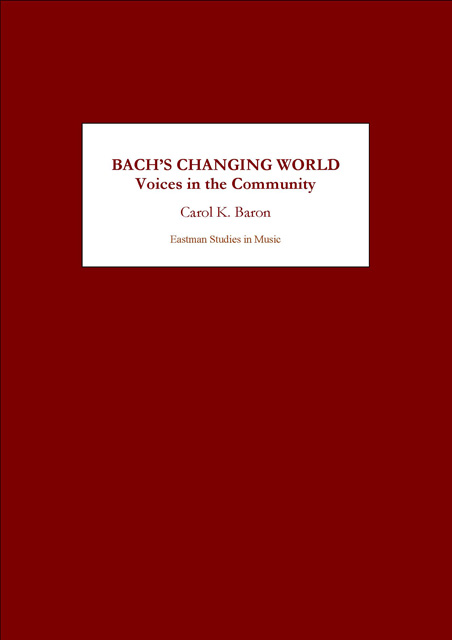Book contents
- Frontmatter
- Dedication
- Map
- Contents
- List of Illustrations
- Editor's Acknowledgments
- 1 Transitions, Transformations, Reversals: Rethinking Bach's World
- 2 Tumultuous Philosophers, Pious Rebels, Revolutionary Teachers, Pedantic Clerics, Vengeful Bureaucrats, Threatened Tyrants, Worldly Mystics: The Religious World Bach Inherited
- 3 Family Values and Dysfunctional Families: Home Life in the Moral Weeklies and Comedies of Bach's Leipzig
- 4 Bach in the Midst of Religious Transition
- 5 Bach's Situation in the Cultural Politics of Contemporary Leipzig
- 6 The Reception of the Cantata during Leipzig Church Services, 1700–1750
- 7 From Salon to Kaffeekranz: Gender Wars and the Coffee Cantata in Bach's Leipzig
- 8 A Treatise on Liturgical Text Settings (1710)
- 9 Random Thoughts About Church Music in Our Day (1721)
- Notes on the Contributors
- Index
- Eastman Studies in Music
7 - From Salon to Kaffeekranz: Gender Wars and the Coffee Cantata in Bach's Leipzig
Published online by Cambridge University Press: 17 March 2023
- Frontmatter
- Dedication
- Map
- Contents
- List of Illustrations
- Editor's Acknowledgments
- 1 Transitions, Transformations, Reversals: Rethinking Bach's World
- 2 Tumultuous Philosophers, Pious Rebels, Revolutionary Teachers, Pedantic Clerics, Vengeful Bureaucrats, Threatened Tyrants, Worldly Mystics: The Religious World Bach Inherited
- 3 Family Values and Dysfunctional Families: Home Life in the Moral Weeklies and Comedies of Bach's Leipzig
- 4 Bach in the Midst of Religious Transition
- 5 Bach's Situation in the Cultural Politics of Contemporary Leipzig
- 6 The Reception of the Cantata during Leipzig Church Services, 1700–1750
- 7 From Salon to Kaffeekranz: Gender Wars and the Coffee Cantata in Bach's Leipzig
- 8 A Treatise on Liturgical Text Settings (1710)
- 9 Random Thoughts About Church Music in Our Day (1721)
- Notes on the Contributors
- Index
- Eastman Studies in Music
Summary
Bach's Coffee Cantata was written and first performed in an intellectual atmosphere charged with antagonism about the role of women in cultural life. It amounted to a gender war. Should women read? Should they study? Could they contribute anything significant? Should they be permitted to? Should their names appear in print? Should they face the same criticism as men? Should they be initiated into learned societies? If they were culturally active, would they still be able to perform their domestic duties? Could a husband still command such a wife? Advocates of differing opinions hurled assertions and accusations, fomented intrigue, and engaged in cultural subterfuge. In the 1730s Leipzigers witnessed—and many participated in—this battle. By the time of Bach's death in 1750 an uneasy consensus on acceptable limits for the participation of women in modern intellectual life had been reached.
There is no doubt that Bach and his associates were well familiar with the antagonists in this debate. There is also no doubt that the Coffee Cantata figured in it. There is only uncertainty about the particular role Bach and other Leipzig personalities played in its production and in the production of another musical satire on women's intellectual ambitions, “Ihr Schönen, höret an” (You ladies, listen well). Until recently the existence of this gender war has remained largely unacknowledged. Therefore, I begin with a summary of it. Next, since the discourse about coffee briefly intersected with the one about women's cultural role, I outline the development of this beverage as a discursive marker for a certain cultural type. Finally, against this background, Bach's Coffee Cantata emerges as something more than a light-hearted musical jest. It was circulated, I propose, as part of the effort at gender containment and pacification.
Gender Wars
When Bach arrived in Leipzig in 1723, women did not write secular texts for publication. The court culture that set the tone in Dresden, Saxony's capital, and even to some extent in Leipzig, Saxony's trade center, modeled itself on Parisian practices: Parisian salons were imitated, for instance, in the home of Leipzig mayor Romanus. Although wives and daughters of professional men imitated certain French fashions and wrote gallant poetry (often with religious overtones) or occasional poetry for family events, unlike their French counterparts they did not publicly challenge male hegemony in the cultural sphere.
- Type
- Chapter
- Information
- Bach's Changing WorldVoices in the Community, pp. 190 - 218Publisher: Boydell & BrewerPrint publication year: 2006
- 1
- Cited by



